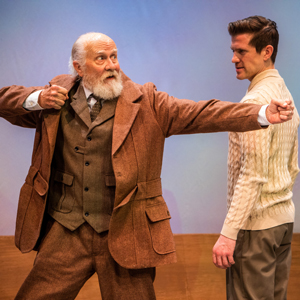
The lives of George Bernard Shaw (who omitted the "George" in daily life) and James "Gene" Tunney could have been mythologized as fables of unpretentious lads whose talents and ambitions brought them worldwide recognition, or as romances of questing polymaths who won the hands and hearts of—if not royal princesses—ladies of immense wealth and social status, nevertheless. A culture preferring its champions to be decisive, intuitive and one-dimensional, however, could not help but be puzzled at the contradictory images of a wordsmith enamored of physical activities and an athlete reveling in "bookish" pursuits.
Was it that the Bowery-bred Tunney achieved celebrity by his prowess at boxing—one of the last recreational pastimes to shed the stigma of its violent origins? Was it that the verbally indefatigable Shaw invited contention by proclaiming his eccentric personal beliefs (atheism, socialism, vegetarianism)? Was it simply the forty-year gap in their ages? Their incontestable heterosexuality? The absence of scandal in their family histories? The Prizefighter and the Playwright, Jay Tunney's biography of his famous father, recounts in depth the intergenerational bond forged by these two dissimilar comrades.
The leisurely contemplation permitted by a nonfiction memoir allows multiple storylines to be explored in full, but the abbreviated structure of a play does not. Douglas Post's stage adaptation of the 2010 memoir, encompasses a mere three characters—Shaw, Tunney and the latter's wife, Polly. Furthermore, the major dramatic action of Shaw vs. Tunney (as it is now titled) revolves on the newlywed couple's stay at an Italian island resort—an idyll interrupted by the bride contracting a mysterious and potentially-fatal illness, surviving only through the eleventh-hour intervention of a pair of doctors, themselves arriving on holiday—a coincidence that even the secularist Shaw declared a "miracle."
Theater audiences more familiar with Shaw might be inclined to bestow on the renowned author of Pygmalion and Major Barbara the status of the "protagonist"—the character whose choices decide the outcome of the story. Playwright Post and director Nick Sandys take care to ensure that everyone shares equal time.
There are two fighters and a referee in the ring during a boxing match, Sandys reminds us, who together determine its progress and its resolution. "Our play, too, features three protagonists, all in search of answers. Shaw experiences an epiphany that leads him to question his world-view, but Gene's journey is that of the hero searching for purpose and validation."
Where in this analogy, then, does Polly fit? Post is quick to reply, "[Polly Lauder and Gene Tunney] were such different creatures—from their peers, from their family members, and from each other. They were drawn together through their love of art and culture, but she still took a big chance by marrying this restless soul, and this is why a big part of the play has to do with her trying to understand exactly where she fits into his life."
"Remember that this young couple had both lost their fathers at a young age," adds Sandys, "His was troubled and combative, while hers was deeply loved, but Gene and Polly both found a parental figure in G.B.S., much as he saw his surrogate children in these two brave, smart young lovers. Polly was a very private person for her entire life—it took a long time for Jay to persuade her to tell this story—but she and her love for both these men are intrinsic to the play."
Post doesn't confine himself to satisfying literary buffs exclusively. Sweet Science-mavens who grow misty-eyed recalling the legendary "Long Count" match between Tunney and Jack Dempsey can also expect to see some pugilistic displays—but the play will not attempt to replicate the gladiatorial glory of that extensively-documented event at Chicago's Soldier Field in 1927. Instead, Post has written a scene where Shaw and Tunney examine the latter's unique fighting style, while invoking the expressive gestures so often seen in discussions of this kind, their body language illustrating the motions their words describe.
"Our play proposes Shaw, at the age of 72, attempting to embody the fighters he has seen—a situation offering a certain leeway, and even some comic possibilities," Sandys admits, "Sam Pearson [who plays Tunney] has engaged a personal trainer, but neither of our actors are boxers. Our preparation has been that of Shaw, in real life, who watched the film of Tunney's fights over and over again, observing every facet of his strategy, down to the smallest movement."
Post makes no secret of his joy at having been granted the opportunity to bring G.B.S. alive for a 21st century audience, "[Shaw] was an intelligent man of great wit and compassion. He was also tremendously funny, and I've tried to capture that, as well as his sense of wonder."
"We are not re-enactors," Sandys insists, "[Audiences] are advised to leave their preconceptions at the door. The characters we meet in Shaw vs. Tunney were "quiet rebels" of their time, hiding their private anxieties behind public personae, but in a crisis, revealing themselves to be vulnerable and very human individuals."
Shaw vs. Tunney plays at Theater Wit through July 8.
Mary Shen Barnidge
Contributing Writer

 Follow Us On Twitter
Follow Us On Twitter